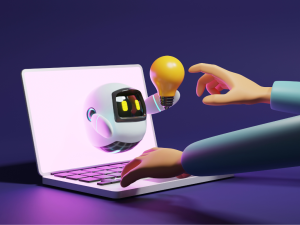Conversational Coding: Redefining the Developer’s Role
There was a time when writing software meant staring at a blank screen and piecing together lines of logic with one keystroke at a time. Over the decades, tools evolved: compilers became more forgiving; integrated development environments made the work less mechanical, and cloud platforms eased infrastructure burden. Yet in 2025, something more profound is taking shape, with developers no longer just writing code. Increasingly, they are conversing with machines that write it for them using artificial intelligence (AI) tools.
This new paradigm is called conversational coding. Instead of typing precise instructions in popular languages, developers explain the problem in natural language. They outline the intended outcome, describe the constraints, and AI generates a working prototype in minutes. Like a junior engineer who never tires, the AI refines its work based on feedback, cycling rapidly until the solution meets requirements.

What Conversational Coding Looks Like
The concept sounds futuristic, but the practice is already here. Imagine a product manager saying, “Build me a booking system that lets customers reserve meeting rooms with email confirmation.” Moments later, an AI development assistant produces the scaffolding of a web app, complete with backend logic and a user interface.
This is not theoretical. Tools like GitHub Copilot and emerging services from Google and Microsoft are already reshaping how work gets done. In fact, at Google I/O 2025 the company unveiled, an AI system capable of generating both design layouts and front-end code from natural prompts. Meanwhile, Microsoft continues to expand its agentic AI framework, with CTO Kevin Scott describing how these systems will eventually interact with the web on our behalf.
The difference between yesterday’s coding assistants and today’s conversational platforms is scale. We are not just getting auto-complete suggestions for small functions. Entire applications are being built in dialogue.
Unlocking Opportunities
Speed to Market
Conversational coding collapses the gap between idea and execution. Start-ups can prototype products in days instead of weeks, while enterprises can test new services without committing large teams in advance.
Accessibility
Barriers to entry are significantly reduced with conversational coding. A business analyst with little technical expertise can formulate workflows in plain English and watch them become functional prototypes. This democratises innovation, allowing more voices to participate in shaping digital products.
Creativity
Freed from meticulous syntax and boilerplate code, developers can devote more energy to architecture, performance, and managing overall experience. In the same way calculators liberated mathematicians from long arithmetic, AI may free software engineers to solve higher-order problems.
Cross-Disciplinary Collaboration
Because prompts are written in everyday language, designers, marketers, and executives can contribute directly to the development process. The conversation shifts from “what can we code” to “what should we create.”
Risks and Limitations
For every good promise technology brings, valid concerns are sure to arise. Here are some hurdles that developers working with AI are currently facing:
Code quality and maintainability remain significant worries. AI-generated code can be functional but bloated, and debugging it without understanding the logic can be time-consuming.
Security is another danger. A recent arXiv paper highlighted vulnerabilities in progressive web apps, proposing frameworks to prevent counterfeit applications. The lesson is clear: convenience often comes at the cost of exposure, and conversational coding must be paired with rigorous security audits.
Skill dilution poses a quieter threat. If junior engineers never wrestle with the fundamentals, their ability to troubleshoot and innovate could erode. An industry over-reliant on black-box AI runs the risk of losing its next generation of master builders.
And finally, ethics must not be ignored. If an AI writes the bulk of a banking application, and that app later fails, where does accountability lie?
Why User Experience Matters More Than Ever
At first glance, conversational coding is about efficiency. Yet the real impact lies in how it reshapes user experience (UX). When anyone can produce a working app, differentiation no longer comes from speed alone. What matters is whether the end product is usable, inclusive, and trustworthy.
This is where UX research plays its decisive role. Quick prototypes need careful validation with real users. Accessibility cannot be an afterthought, especially as applications spread across markets and demographics. The companies that succeed will be those that combine AI-assisted speed with human-centred design rigour.
What Businesses Should Do Now
- Treat AI as a collaborator, not a replacement. Developers are becoming strategists and curators rather than typists.
- Invest in AI literacy across the organisation. Non-technical staff should understand both the potential and the limits of conversational coding.
- Strengthen governance and security policies. Incorporate AI-generated code into information security frameworks such as ISO/IEC 27001 to mitigate risks.
- Experiment with low-risk projects first. Internal tools or prototypes are safer places to test conversational coding before customer-facing deployments.
A Redefinition, not a Replacement
Conversational coding does not herald the end of developers. Rather, it redefines their role. Instead of labouring over every semicolon, they orchestrate AI collaborators, ensure architectural integrity, and, above all, safeguard the human experience.
Just as past generations of engineers adapted to compilers, IDEs, and cloud platforms, today’s teams must adapt to a future where conversation is the new code. The winners will not be those who abandon human expertise, but those who blend it with machine capability in ways that are responsible, creative, and profoundly human-centred.
About USER
User Experience Researchers Pte Ltd (USER) is a leading UX-focused company specialising in digital transformation consultancy, agile development, and workforce solutions. We have a steadfast commitment to innovating the best of today’s technology to promote sustainable growth for businesses and industries.
For more information, contact USER throughproject@user.com.sg
Article by Devine Frilles



